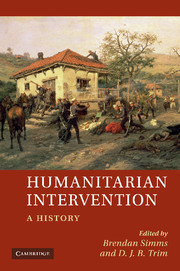Book contents
- Frontmatter
- Contents
- List of maps
- Notes on contributors
- Acknowledgements
- List of abbreviations
- 1 Towards a history of humanitarian intervention
- Part I Early modern precedents
- Part II The Great Powers and the Ottoman Empire
- 5 ‘From an umpire to a competitor’: Castlereagh, Canning and the issue of international intervention in the wake of the Napoleonic Wars
- 6 Intervening in the Jewish question, 1840–1878
- 7 The ‘principles of humanity’ and the European powers' intervention in Ottoman Lebanon and Syria in 1860–1861
- 8 The guarantees of humanity: the Concert of Europe and the origins of the Russo–Ottoman War of 1877
- 9 The European powers' intervention in Macedonia, 1903–1908: an instance of humanitarian intervention?
- Part III Intervening in Africa
- Part IV Non-European states
- Part V Postscript
- Index
5 - ‘From an umpire to a competitor’: Castlereagh, Canning and the issue of international intervention in the wake of the Napoleonic Wars
Published online by Cambridge University Press: 18 April 2011
- Frontmatter
- Contents
- List of maps
- Notes on contributors
- Acknowledgements
- List of abbreviations
- 1 Towards a history of humanitarian intervention
- Part I Early modern precedents
- Part II The Great Powers and the Ottoman Empire
- 5 ‘From an umpire to a competitor’: Castlereagh, Canning and the issue of international intervention in the wake of the Napoleonic Wars
- 6 Intervening in the Jewish question, 1840–1878
- 7 The ‘principles of humanity’ and the European powers' intervention in Ottoman Lebanon and Syria in 1860–1861
- 8 The guarantees of humanity: the Concert of Europe and the origins of the Russo–Ottoman War of 1877
- 9 The European powers' intervention in Macedonia, 1903–1908: an instance of humanitarian intervention?
- Part III Intervening in Africa
- Part IV Non-European states
- Part V Postscript
- Index
Summary
There seems to be no little need that the whole doctrine of non-interference with foreign nations should be reconsidered … with a view to establish some rule or criterion whereby the justifiableness of intervening in the affairs of other countries, and (what is sometimes fully as questionable) the justifiableness of refraining from intervention, may be brought to a definite and rational test.
John Stuart Mill, 1859In seeking to outline the historical genesis of a modern political concept, there is always the danger of anachronism and teleology. It is with that in mind that this chapter focuses on a period in British history when the contra-principle to humanitarian intervention – that is, the principle of non-intervention – was in the ascendant. The aim is to provide an insight into the twisted, accidental, but sequential origins of what was later understood as humanitarian intervention. The focus is on British foreign policy from the Battle of Waterloo in 1815 to the Battle of Navarino in 1827. Although this volume contains a number of chapters which pre-date the period of the Napoleonic Wars and it is misleading to assume that these debates started in 1815 – or even 1793 – the reality is that many theorists of intervention have traditionally taken, and still do take, this period as the starting point for their analysis. That was as true for John Stuart Mill, writing in the 1850s, as it is for Gary J. Bass in his 2008 work, Freedom's Battle: The Origins of Humanitarian Intervention.
- Type
- Chapter
- Information
- Humanitarian InterventionA History, pp. 117 - 138Publisher: Cambridge University PressPrint publication year: 2011
- 3
- Cited by

